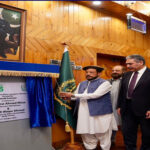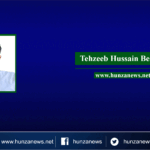GILGIT:As the country’s seasoned linguists were delivering presentations on regional languages during a meeting at the Parliament House, Islamabad earlier this week, Muhammad Zafar Shakir from Gilgit- Baltistan (G-B) was wondering if his mother tongue – Shina – would ever get the esteemed status of a national language.
HunzaNews March 17th, 2014.
Shakir, a lecturer at the Department of Modern Languages at Karakoram International University (KIU) Gilgit, was representing the region in a meeting of the National Assembly Standing Committee on Information, Broadcasting and National Heritage.
The meeting, presided over by MNA Marvi Memon, discussed the historical importance of mother tongues, their need for attaining the status of a national language and role in creating inter-provincial harmony. “It was a historic moment for me to be presenting G-B and Shina at the forum,” Shakir told The Express Tribune on Saturday.
At least 35 scholars, linguists, experts and academics were invited from all over Pakistan to provide their expert opinion on the subject. Several other lawmakers attended the meeting which saw discussions on Balochi, Balti, Burushaski, Brahui, Hindko, Khowar, Kashmiri, Pahari, Pashto, Punjabi, Saraiki, Shina and Sindhi, among other regional languages spoken in the country.
When Shakir was asked at the meeting if Shina should be given the status of a national language, he said, “Asking this would be like asking a blind man if he would like to have vision,” recalled Shakir, whose presentation earned him a standing ovation. Memon was especially appreciating his presentation and in-depth knowledge of regional languages.
Pleading Shina’s case to be declared a national language, Shakir said it will help minimise G-B’s identity crisis, as the region still lacks representation in Parliament. Apart from G-B, Shina is spoken in Khyber-Pakhtunkhwa, parts of Afghanistan and both occupied and Azad Jammu and Kashmir.
“Education in one’s mother tongue is something which is earning recognition across the world now,” said Shakir, who is also an active member of the Shina Language and Culture Promotion Society. The society is a regional organisation dedicated to preserving the Shina language and the culture associated with it. It has so far published more than a dozen books in Shina, a widely spoken language in the region.
Explaining why Shina should be recognised as a national language, he said: “As people of different regions become familiar with other languages, the gap between the two lessens.”
Shakir, who was chosen for the presentation by KIU VC Dr Najma Najam, said he was grateful for being chosen to represent the language and vowed to continue working for its preservation. “It is my dream to see Shina become a national language and now I am optimistic that it may happen soon,” said Shakir.
Express























